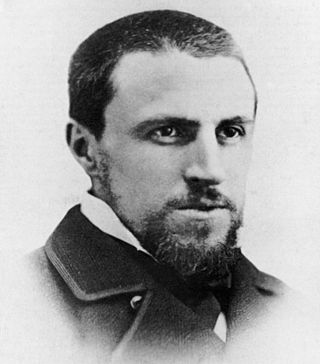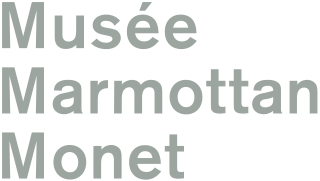
Oscar-Claude Monet was a French painter and founder of impressionist painting who is seen as a key precursor to modernism, especially in his attempts to paint nature as he perceived it. During his long career, he was the most consistent and prolific practitioner of impressionism's philosophy of expressing one's perceptions before nature, especially as applied to plein air (outdoor) landscape painting. The term "Impressionism" is derived from the title of his painting Impression, soleil levant, exhibited in 1874 initiated by Monet and his associates as an alternative to the Salon.

Gustave Caillebotte was a French painter who was a member and patron of the Impressionists, although he painted in a more realistic manner than many others in the group. Caillebotte was known for his early interest in photography as an art form.

Giverny is a commune in the northern French department of Eure. The village is located on the "right bank" of the river Seine at its confluence with the river Epte. It lies 80 km (50 mi) west-northwest of Paris, in the region of Normandy. It is best known as the location of Claude Monet's garden and home.

Musée Marmottan Monet is an art museum in Paris, France, dedicated to artist Claude Monet. The collection features over three hundred Impressionist and Post-Impressionist paintings by Claude Monet, including his 1872 Impression, Sunrise. The museum's fame is the result of a donation in 1966 by Michel Monet, Claude's second son and only heir.

Haystacks is the common English title for a series of impressionist paintings by Claude Monet. The principal subject of each painting in the series is stacks of harvested wheat. The title refers primarily to a twenty-five canvas series which Monet began near the end of the summer of 1890 and continued through the following spring, though Monet also produced five earlier paintings using this same stack subject. A precursor to the series is the 1884 Haystack Near Giverny.

Ernest Hoschedé was a department store magnate in Paris. Also during the successful period of his life, he was an art collector and critic. He lost his Impressionist art collection when he went bankrupt in 1877–1878. He moved his family into the home of Claude Monet in Vétheuil. He then lived in Paris and worked at Le Voltaire and then Magazine Français Illustré. His family continued to live with the Monets before and after his death. The year after his death, his wife Alice Hoschedé married Claude Monet, and was believed to have been Monet's mistress for years.

The Regatta at Sainte-Adresse is an oil-on-canvas painting by the impressionist painter Claude Monet. It was painted in 1867 and is owned by the Metropolitan Museum of Art.

Blanche Hoschedé Monet was a French painter who was both the stepdaughter and the daughter-in-law of Claude Monet.

The Musée d'art moderne André Malraux is a museum in Le Havre, France containing one of the nation's most extensive collections of impressionist paintings. It was designed by Atelier LWD, an architecture studio led by Guy Lagneau, Michel Weill and Jean Dimitrijevic. It is named after André Malraux, Minister of Culture when the museum was opened in 1961.

Springtime or The Reader is an 1872 painting by the French Impressionist painter Claude Monet. It depicts his first wife, Camille Doncieux, seated reading beneath a canopy of lilacs. The painting is presently held by the Walters Art Museum.

The Fondation Claude Monet is a nonprofit organisation that runs and preserves the house and gardens of Claude Monet in Giverny, France, where Monet lived and painted for 43 years. Monet was inspired by his gardens, and spent years transforming them, planting thousands of flowers. He believed that it was important to surround himself with nature and paint outdoors. He created many paintings of his house and gardens, especially of water lilies in the pond, the Japanese bridge, and a weeping willow tree.

Albert Lebourg, birth name Albert-Marie Lebourg, also called Albert-Charles Lebourg and Charles Albert Lebourg, was a French Impressionist and Post-Impressionist landscape painter of the Rouen School. Member of the Société des Artistes Français, he actively worked in a luminous Impressionist style, creating more than 2,000 landscapes during his lifetime. The artist was represented by Galerie Mancini in Paris in 1896, in 1899 and 1910 by : Galerie Bernheim-Jeune, 1903 and 1906 at the Galerie Paul Rosenberg, and 1918 and 1923 at Galerie Georges Petit.

Michel Monet was the second son of Claude Monet and Camille Doncieux Monet.

The Artist's Garden at Giverny is an oil on canvas painting by Claude Monet done in 1900, now in the Musée d'Orsay, Paris.

Argenteuil is an 1874 oil on canvas painting by Édouard Manet (1832-1883), first exhibited at the Paris Salon of 1875. It is one of Manet's first works to qualify fully as an Impressionist work, due to its naturalistic subject and its bold palette, such as the blue of the river, mocked by the Figaro journalist Jean Rousseau as "in the foreground, Argenteuil jam on an indigo river" It is now in the Musée des beaux-arts in Tournai, Belgium.

Woman in the Garden is a painting begun in 1866 by Claude Monet when he was a young man of 26. The work was executed en plein air in oil on canvas with a relatively large size of 82 by 101 cm. and currently belongs in the collection of the Hermitage Museum in St Petersburg, Russia.
Josef Karl PaulOtto Krebs was a German industrialist and major collector of late 19th and early 20th century French paintings, particularly those of Cézanne, Van Gogh and Gauguin. Seized by the Red Army and taken to Leningrad as war reparations, his collection is still housed at the Hermitage Museum in that city.

The Seine at Rouen is an 1872 oil on canvas painting by Claude Monet, now part of the Otto Krebs collection at the Hermitage Museum in Saint Petersburg. It shows a sunny scene of sailing boats moored by the quays on the Seine in Rouen.

A Corner in the Garden at Montgeron is an oil on canvas painting by Claude Monet, from 1876. It is held in the Hermitage Museum, in Saint Petersburg.


















